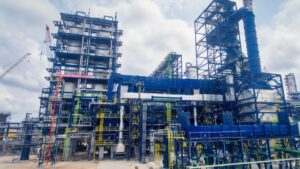
Kerosene price increased by 98.76% – NBS
The National Bureau of Statistics says on a year- on-year basis, the average retail price per litre of household kerosene increased by 98.76 per cent in July 2022.
This is according to the NBS National Household Kerosene Price Watch for July 2022 released in Abuja on Friday.
According to the report, the average retail price per litre of the product rose by 98.76 per cent from N397.34 in July 2021 to N789.75 in July 2022.
The report said on a month-on-month basis, there was a 3.68 per cent increase of the product in July 2022 at N789.75 compared to N761.69 recorded in June 2022.
On state profile analysis, the report revealed that the highest average price per litre of kerosene in July 2022 was recorded in Enugu State with N1,003.68, followed by Ekiti State with N989.58 and Osun State with N949.12.
On the other hand, the lowest price was recorded in Bayelsa State with N643.06, followed by Benue State with N654.76 and Rivers State with N655.24.
The report said that analysis by zone showed that the South-West recorded the highest average retail price per litre of household kerosene with N900.90, followed by the South-East with N892.40 and North-Central with N761.92, while the South-South recorded the lowest with N727.07.’
The News Agency of Nigeria reports that the average retail price per gallon of household kerosene paid by consumers in July 2022 was N2,886.41, showing an increase of 7.98 per cent from N2,673.04 in June 2022.
The report said while on a year-on-year basis, the increase indicated a 121.60 per cent increase from N1,302.56 in July 2021.
On state profile analysis, Abuja recorded the highest average retail price per gallon of household kerosene with N3,600.00, followed by Enugu State with N3,500.75 and Ekiti State with N3,450.00.
On the other hand, the report said Zamfara State recorded the lowest price with N2,430.57, followed by Borno and Gombe states with N2,500 and N2,530 respectively.
Analysis by zone showed that the South-West recorded the highest average retail price per gallon of household kerosene with N3,186.93, followed by the South-East and North-Central with N3,130.76 and N2,924.73 respectively.
The North-East recorded the lowest average retail price per gallon with N2,597.04.
Similarly, the Liquefied Petroleum Gas (cooking gas) Price Watch for July 2022 revealed a 105.35 per cent increase of refilling 5kg of the product on a year-on –year basis.
According to the report, on a year-on-year basis, this rose by 105.35 per cent from N2,141.59 in July 2021 to N4,397.68 in July 2022.
The report said the average retail price for refilling a 5kg cylinder of cooking gas increased by 4.25 per cent on a month-on-month basis from N4,218.38 recorded in June 2022 to N4,397.68 in July 2022.
On state profile analysis, Adamawa State recorded the highest average price for refilling a 5kg cooking gas cylinder with N4,966.67, followed by Plateau State with N4,650.00, and Kwara and Gombe state with N4,625.00 each.
On the other hand, the report said Kano State recorded the lowest price with N3, 981.25, followed by Yobe and Bauchi with N4,000.00 and N4,071.03 respectively.



